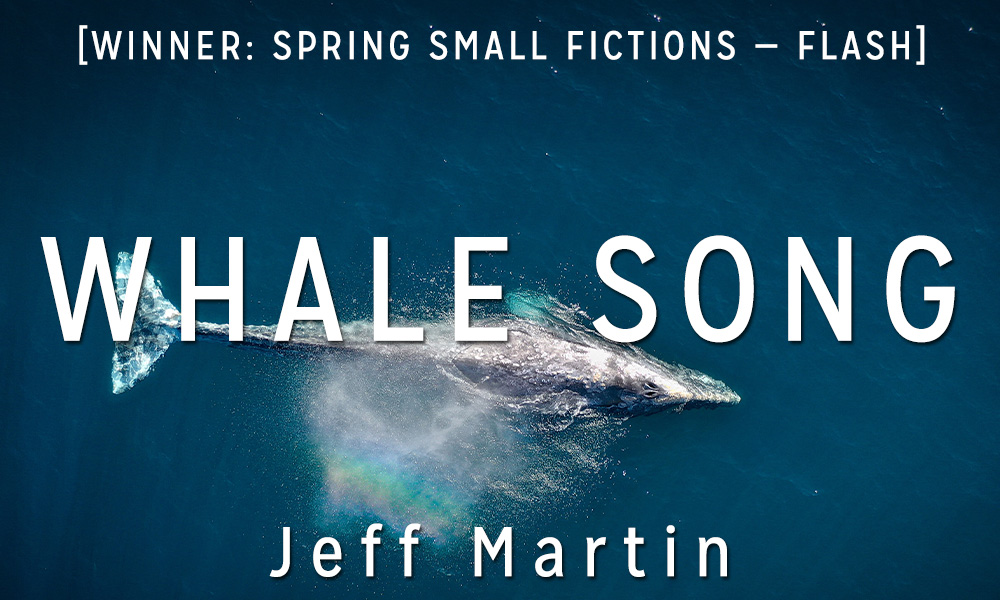“Whale Song” is utterly gorgeous, melancholic, and tender. The use of the collective voice is resonant and so effective, and this story had endless emotional depth; it reminds us that stories, above all else, can make us feel. This is the kind of flash story that accomplishes what novels try to do, demonstrating all the possibilities of the form: to zoom in and out at the same time, to freeze and speed up time, to be deeply specific and very expansive, to be meaningful and musical, to be an ode, an elegy, and a celebration all at once. It’s pure magic. — Guest Judge K-Ming Chang

In kindergarten when Mrs. Bowersox was teaching us how to read, she spent a lot of time on the “h” in “whale.” She’d taped a big picture of a blue whale to the wall beside the letter “W” in the corner where all the letters gathered, and she told us it was whale, that we had to pronounce the “h” or we’d be saying the word “wail”, which was a different word entirely and not a fun one. You wailed, she said, if you fell on the blacktop at recess and cut your knee; you whaled if you got in a boat and went hunting for whales.
It was hard not to love Mrs. Bowersox as a mother because she was concerned about us in a way our own mothers weren’t. Not that they were bad people—they were still our mothers— but they didn’t care if we said wail or whale and they had work just like our fathers so we let ourselves in after school with keys we were proud and ashamed of at the same time.
There is a whale in the ocean, Mrs. Bowersox said, and on the bus home we’d look out at the lake going past and we’d say, There is a whale in the lake, and it was thrilling to think of whales in our own lake. It was thrilling to think of them at home together with a lamp on at night.
By sixth grade we’d forgotten about whales until a substitute teacher came to geography one day and put in a tape of people on a boat at sea. This was 6-2-W, so most of us were fine with this. The smart kids were in 6-1-W, the bad kids in 6-2-Y, and in 6-2-W the point was just to be average. But Arnold Emsweiler, somewhere between 6-2-W and 6-1-W, wanted to know why we were watching a show about boats in geography.
The ocean is geography, the sub said, and fast forwarded through some commercials.
But Arnold wanted to know if she was really a geography teacher. No, she said, she was a math teacher. Then what are you doing here? Arnold asked, and the sub said that was a good question.
The show was about whale songs. The people on the boat put microphones in the water, which seemed insane, but nobody was electrocuted. Instead we heard the noises the whales made, long o’s and whistles that sort of freaked us out. They sounded like aliens. That went on for maybe twenty minutes but even Arnold Emsweiler didn’t get bored. They’re talking to each other, someone in the show said, and it was so stupidly obvious we should have made fun of it but no one did. We listened to mothers calling to children and children calling to mothers and brothers calling to sisters and maybe cousins calling to cousins. When it was done we were surprised we were mad at the sub for stopping it.
Ooooooo-ooooo, we said to each other for weeks afterward and every time the bus rolled past the lake. Oooo-errrrrr-ooooooo. At home we’d call each other on the phone and not say a word, just sing whale songs because there was no one around to ask us what we were doing. To sing a whale song and then hear it back from the other end was so comforting it put us to sleep.
In eleventh grade two of us got cars, terrible, awful cars, but we worked and bought them and then a third one of us got a car and then we rode around the lake in the afternoons and at night sometimes listening to the one station the antenna could get. And then one of us tore out the stock exhaust and put in a catback and then we heard the car for miles before we saw it, and that made the other two tear out their stock and strip headers and mufflers. Around the lake we’d go, one of us revving loud on one side, then listening for a roar from the other side. It was thrilling to call across the water and hear the distant answer from the dark shape of trees, to know the others were out there circling as we were. Sing! we’d yell across the water and the song would come back to us and then we’d sing and back and forth until the gas was low and the stars were out.
Mrs. Bowersox was dead by then and we missed her. None of us had gone to the funeral, none of us knew how to go to a funeral. She would have hated the cars for the wailing they made. They were for her, anyway.
 Jeff Martin’s stories have appeared in New England Review, Mississippi Review, Sou’wester, and No Tokens Journal, among others. He works and teaches in the University of Virginia’s School of Continuing and Professional Studies. Select stories are available online at https://readjeffmartin.com/.
Jeff Martin’s stories have appeared in New England Review, Mississippi Review, Sou’wester, and No Tokens Journal, among others. He works and teaches in the University of Virginia’s School of Continuing and Professional Studies. Select stories are available online at https://readjeffmartin.com/.
